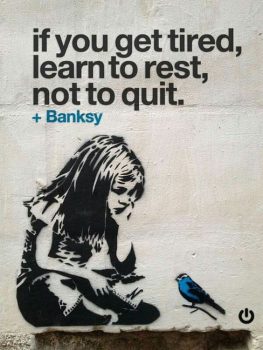Directly after New Zealand Prime Minister Jacinta Ardern presented her national Covid-19 plan, a journalist asked if she was scared. “No,” Arden responded, “because we have a plan.”
When the extraordinary happens and reality unfurls at rapid speed, planning may seem an impossibility.
But not only does having a small business plan make you feel more confident and give you a sense of control, it’s a smart thing to do, and puts you in a resourceful frame of mind.
First, don’t focus on the end result. Attempting to predict the future right now can end up in a bleak place. Instead, focus on the practice of planning.
By making space for planning, to take stock, consider your options and forge a path forward, you’re looking after yourself. You’re taking control of chaos. You’re slowing down and considering, and reconnecting with your desire to be of service to your clients and wider community. If you’ve been stuck, this can be the loving push you need to get moving again.
Take an inventory of your capacities
Last month, I had a woman in one of my courses who only ever spoke when pointing out a problem or hurdle. This doesn’t make for a productive learning experience.
When we only focus on problems or hindrances, our mind closes to possibilities and becomes more negative, fearful, and self-defeating. What we seek, we find.
Conversely, when we focus on our strengths, capacities, and opportunities, we put ourselves into a creative, resourceful frame-of-mind.
Take an inventory of your strengths right now:
- What skills do you have that others don’t?
- What assets, programs, documents or systems do you have that can help?
- What do your clients need right now? What are they asking for?
- What quick and easy changes can you make right now, to move your services online?
Opportunities within the current climate
People are still spending money and will continue to do so. For small business owners, there are plenty of opportunities.
Look at the below small business ideas and ask yourself which you could do, and which fits your business:
- How to entertain kids and keep them engaged and learning
- How to work from home without resorting to bad daytime TV, news obsessiveness, and checking the fridge contents 4,234 times before lunch
- How to keep communicating with staff who are fearful, stressed, and overwhelmed, and dealing with a new working routine
- At-home fitness that you can easily do to keep yourself sane
- Meditation and mindfulness techniques to deal with stress, anxiety and overthinking
- How to communicate with existing clients to keep them feeling confident and committed to your business
- How to grow your own food and recipe ideas
- How to use technology to stay in touch with people and do necessary errands or tasks
- How to be a good neighbour and friend when we’re physically isolating
- Ways to get involved more with your community without leaving your house
- Local businesses that you can encourage others to support
- How to declutter your house and do deep cleaning
- How to write poetry, understand War and Peace, or (finally) learn to play that guitar you had high expectations for
- Comedy and entertainment: always popular and needed now more than ever.
Simplify your plan to the next 90 days
Together, my clients and I set goals – annual goals as well as quarterly goals – and write detailed 90-day action plans to achieve these. In mid-March, I finished teaching face-to-face courses and set aside my 90-day plan for the second quarter of this year. I wrote a new plan.
Priorities are ordered by:
1. Regular existing clients
2. One-off project clients
3. Sporadic clients
4. Past clients
5. Declined clients (those who we’ve quoted or who inquired, but didn’t become clients).
Together, we brainstormed ideas created plans for each of these groups, both reactive (when clients are asking for refunds or stopping work) and proactive (getting in touch and making new offers).
Easy ways for you to help and things you can ask others for
 Easy and simple things that you can do to help your small business friends without spending a load of money, and ways you can ask for help, include:
Easy and simple things that you can do to help your small business friends without spending a load of money, and ways you can ask for help, include:
- Asking for, and giving, Google reviews
- Asking for, and giving, Facebook page reviews
- Asking family and friends for referrals to people they know of who may need your services
- Asking past and present clients for testimonials, as well as referrals
- Asking your mafia: your colleagues, (friendly) competitors, and business friends.
We are in this together – let’s collaborate
Small business owners often make life and business far harder than it needs to be by being too independent – not asking for what they want, not collaborating, not referring people on, and believing they need to figure every little thing out by themselves.
Now, more than ever, we need each other. If your small business is to survive, we need to band together.
Think about what complementary businesses you could collaborate with. Who are you already sending people to? Who is already sending people your way? What local businesses could you talk with, to package your goods and services together, to use each others’ audiences, to grow together?
Now is a great time to reach out, introduce yourself, strengthen existing relationships and forge new ones. We are far stronger together.
 Improve your self-care, strengthen your boundaries
Improve your self-care, strengthen your boundaries
After rewriting plans, it’s time to focus day-to-day, hour-to-hour, and how to improve our self-care and strengthen our boundaries.
Now is as good a time as any to redesign your working days. And boundaries are more important right now than ever. How this may look like includes speaking to friends and family at set times of the day (rather than letting phone calls interrupt your focus), recreating ‘start work’ and ‘stop work’ rituals, and wrestling back control over our technology, using technology to create boundaries rather than erode them.
You’re amazing
I’m in awe of how so many of my clients fast-forwarded their plans to get online and have quickly moved their entire face-to-face services onto the net. They are videoing, uploading, starting memberships, introducing new online courses, events and classes for the very first time.
What you’re doing right now will fortify your business in the months and years to come. Focus on your strengths and advantages, look at what you can do right now.
Don’t get disheartened by technology. What you want to do can always be done more simply and more easily (just ask me in the comments below this blog).
As we bunker down, we need hope, comedy, humanity. Your business can provide that. Especially if you work in the health or wellbeing sectors, don’t step back, step forward. We need you.
As Brené Brown says, “we can be our worst selves when we’re afraid, or our very best, bravest selves.”





